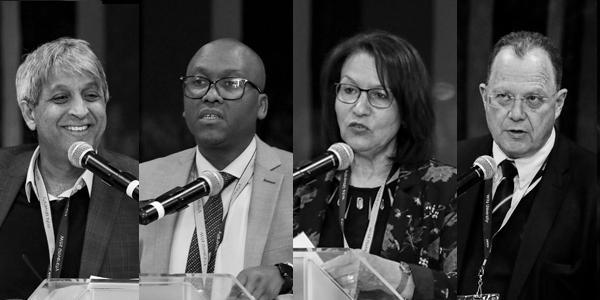Happy one hundred for Health
- Ufrieda Ho
Birthdays are milestones and the health sciences at Wits celebrated a significant one on 1 July when it marked 100 years of teaching excellence.
Back in 1919, three years before the University of Witwatersrand was officially established, there were 24 students enrolled in this nascent medical school and teaching took place in a wooden lean-to next to the South African Institute for Medical Research on Hospital Street, in Hillbrow. By 1925 however, a young Johannesburg had its first four locally-qualified doctors.
These were the humble beginnings of medical training and teaching in the city that would eventually give rise to the Wits Faculty of Health Sciences as we know it today. In the last 100 years more than 27 000 students have graduated from the faculty. Many of these healthcare professionals and researchers have made life-saving and life-changing impacts on the people of the city, throughout South African and across the continent and the globe.
It’s the likes of Nobel Laureate Sydney Brenner recognised for his work on genetic codes and molecular biology; leadership in vaccinology ; rural health advocacy; changing public health policy around recommended sugar and salt intake and; pioneering surgeries, including the liver transplant of an HIV positive mother to her HIV negative child.
Professor Martin Veller, Dean of the Faculty, said at the celebratory function on 1 July that the legacy of world-class teaching continues today by responding to the healthcare needs and pressures of a changing world. Last year the faculty conferred degrees on 1300 students; published around 1500 research papers and raised R2 billion in grants. There are currently 6500 students across the faculty’s seven schools, with over 40 percent of these are in postgraduate studies, Veller said.

He added that the early medical school and the University have built resilience surviving trying times, including two world wars and the tyranny of apartheid. It is apartheid though that holds some of the biggest lessons for the university, said Vice Chancellor Adam Habib, who also addressed a packed foyer for the 1 July celebrations held at the faculty’s York Road building.
Habib noted the poignant achievements and contributions from the school but his caveat is that the university cannot afford to ignore darker parts of its history, most notably the impact of racial exclusion.
“We cannot forget that in the 60s and 70s black doctors could not work on white cadavers, we cannot forget that black medical professionals felt alienated.
“We must also not forget that as much as we were configured by the society Wits also stood up against apartheid. We have to claim all of our history, the positive and the negative so that we affirm the experiences of what people went through so that we can reflect, rebuild and move forward,” said Habib.
The Vice-Chancellor also addressed the need for government and the university to fix a relationship that he said in post-apartheid times has sometimes resembled two battered spouses – staying together but routinely abusing and hurting each other.
Newly appointed Gauteng MEC for Health Dr Bandile Masuku was a special guest at the 100 years celebrations.
Habib said when government and the university are at loggerheads it’s a lose-lose relationship. It stymies Wits’ growth and dents its status as a leading university on the continent. At the same time government’s ability to deliver on its healthcare mandate to the population is negatively affected when the university is not able to graduate the professionals needed by the public healthcare system.
Habib gave his pledge to work with government in a symbiotic relationship and to make this the hallmark of how the faculty’s story unfolds in the years to come.
Masuku in his address also called for a more productive, transformed relationship between government and Wits. The MEC also addressed the need to improve the quality of healthcare, to close gaps between private and public healthcare, raise morale among staff and to improve health literacy.
“We are here tonight to celebrate excellence but we are also here to reflect on our journey to democracy and how we move forward to produce knowledge that is helpful and impactful for the people of South Africa and across the continent,” Masuku said.
Masuku highlighted the need to decolonise health sciences and knowledge production and for innovative ways to incorporate indigenous knowledge in teaching.

